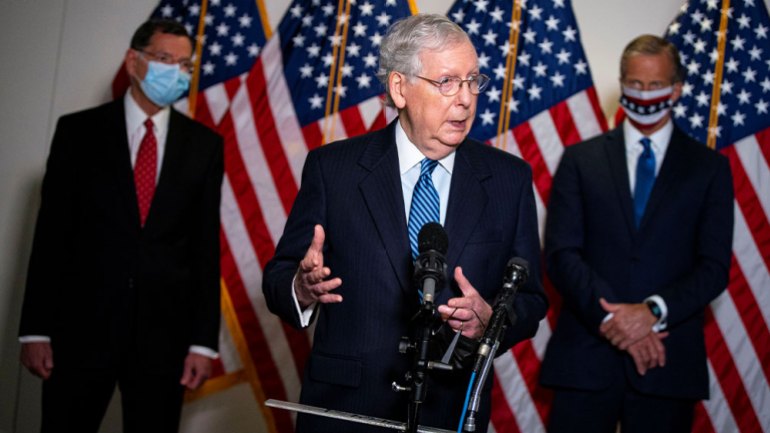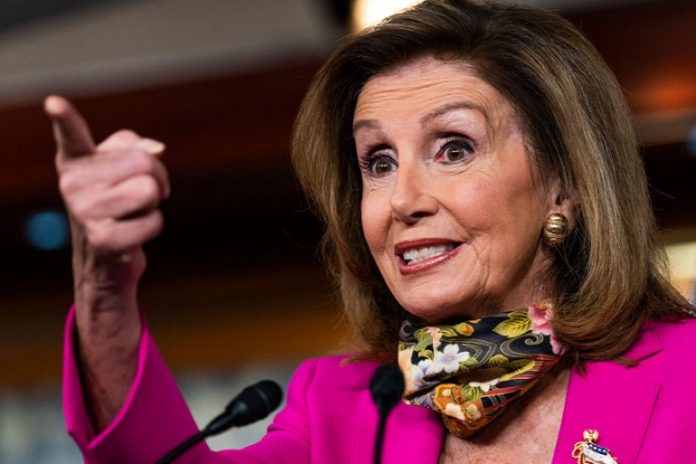Democrats controlling the House of Representatives on Tuesday delayed a planned vote on a funding bill that would keep United States government agencies running and prevent a government shutdown on September 30.
“At some point in the next day or two, we expect that there will be a continuing resolution on the floor that will continue the current spending agreement until December,” said Representative Hakeem Jefferies, chairman of the House Democratic caucus. He said he hoped it would be “bipartisan in nature”.
Democratic leaders who control the House had advanced a temporary spending bill that did not extend President Donald Trump’s authority to give out more farm aid. But they are facing pushback from Republicans and uneasy Democratic farm-state legislators in the House.
US farmers have been suffering from low commodity prices and the effects of higher trade tariffs imposed by President Trump. The president announced a new $13bn allotment of bailout funding at a political rally in Wisconsin last week. The provision Republicans seek would keep the door open for additional election-eve pronouncements.
“We do prefer additional farm aid”, Trump economic adviser Larry Kudlow said. Senate Majority Leader Mitch McConnell, a Republican, said on Twitter that the House Democrats’ temporary funding bill “shamefully leaves out key relief and support that American farmers need”.
Democrats complain that the Trump administration has favoured larger farm producers and Southern states such as Georgia – a key swing state and home of Agriculture Secretary Sonny Perdue – in distributing bailout funds.
“The Trump administration has proven they cannot be trusted to distribute payments fairly,” said Senator Debbie Stabenow of Michigan, a top Democrat on the Senate Agriculture Committee.
The US Agriculture Department does not need the authority to meet farm obligations and will get the money in November anyway, Stabenow said.
The Republican chairman of the Agriculture panel, Senator Pat Roberts of Kansas was angry about the Democrats’ omission of the farm aid that Trump wants in the House bill but said Republicans are not going to prompt a confrontation over it.
“I understand there are people upset with the secretary and what he has done or will do or whatever with regards to [farm] funding,” Roberts said.
“But this is desperately needed and there’s 45 to 50 programmes that would be in danger, right in the middle of the COVID thing, the farm crisis, and the whole business,” he said.
The stopgap funding bill came as negotiations on a huge COVID-19 relief bill have collapsed and as the Senate has been thrust into an election-season Supreme Court confirmation fight after the death of Justice Ruth Bader Ginsburg.

Congressional aides close to the talks had depicted the farm provision as a bargaining chip to seek comparable wins for Democrats, but House Speaker Nancy Pelosi’s requests for provisions related to the Census and funding for states to help them carry out elections later this year were denied by GOP negotiators.
Pelosi appeared to believe that Republicans controlling the Senate have little choice but to accept it, but may have lost sight of the needs of her farm-state Democrats.
The stopgap spending bill also requires Democratic votes to pass the Senate, and McConnell retains the right to structure Senate votes that could make Democrats, especially those from farm country, uncomfortable, or even put them in the position of filibustering the measure and taking the blame for any ensuing shutdown.
At stake is the 30 percent of the federal government’s day-to-day budget that goes to cabinet agency operations funded by Congress each year.
The annual appropriations process broke down in the Senate earlier this year and it is unclear but probably unlikely that the $1.3 trillion in agency spending bills will be enacted this year, even in a post-election lame-duck session, especially if Joe Biden is elected to replace Trump.
In the past, both Democrats and Republicans have sought to use government funding deadlines and must-past temporary funding bills as leverage to try to win concessions elsewhere on Washington’s agenda. Such efforts invariably have failed.
Republicans in 2013 used it in an unsuccessful attempt to prevent implementation of the so-called “Obamacare” healthcare law and Senate Democrats returned the favour in 2018 in a futile effort to force debate on permitting immigrants brought into the country illegally as children – “Dreamers” – to remain in the US.
Pelosi said she would not attempt any such confrontation this year.
“We’re not about shutting down government,” Pelosi said Monday night on MSNBC. “And it’s not a lever.”
The legislation, called a continuing resolution, would keep every federal agency running at present funding levels through December 11, which will keep the government afloat past the election.
The measure extends many programmes whose funding or authorisations lapse on September 30, including the federal flood insurance programme, highway and transit programmes, and a long set of extensions of various health programmes – such as a provision to prevent Medicaid cuts to hospitals that serve many poor people.
It finances the possible transition to a new administration if Joe Biden wins the White House and would stave off an unwelcome COVID-caused increase in health insurance costs for older Americans under Medicare.
Source – News Agencies
















